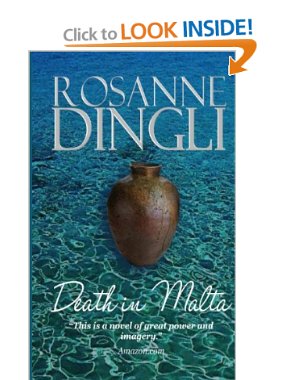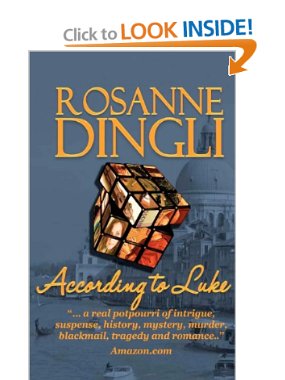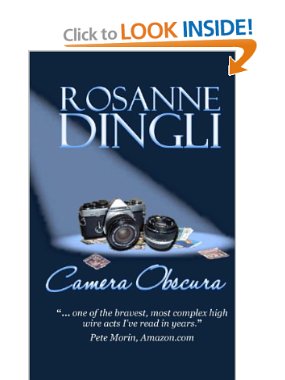
Sometimes, you find yourself with an interview that tells you the truth about the publishing industry. For all you guys and girls out there wondering if this is the thing for you, please consider one thing: There’s very little money to be made; so if you want to make money, maybe it’s better to be a doctor, lawyer or maybe a pop star or something. Writing is more about the art; granted, there are exceptions– if your name is Stephen King, you may become fantastically rich and live in seclusion. However, the usual reality for writers is that you work a “day” job and write on the side. That said, it’s a wonderful, wonderful skill to have and, if you write for the sake of art, you will love it! Just don’t have expectations of grandeur! Please meet Rosanne Dingli! An award-winning Australian writer who says it exactly as it is…
Q) Let me start by asking, Rosanne, why writing? What made you want to write a book? What was the catalyst?
A) Although I should say it’s too long ago to remember, I do. It was 1985, I was living in the country, and I had been asked once too many times what I did for a living. I used to say I was a writer, because I’d just bought an Olivetti typewriter and used to write to my mother in Europe quite a lot, from my little town in NSW, Australia. The day came when I had to do something about the big myth. So I bought a book called “How to be a Writer” or some such title, did exactly what it said, and soon I started getting published in academic journals, magazines, newspaper supplements and what have you. By 1991, I had enough poetry published to send out a collection, which Literary Mouse Press accepted and released. The rest is (exhausting) history.
Q) You have won many awards. Has that changed the way you write? Do you write with more confidence now, or does it actually make you nervous?
A) I don’t think I’ve had a nervous day in my life – when it comes to writing. I don’t have to make a living from it now, but of course there have been many years when I made a very good living from writing, thank you. Not fiction, though – I have held various roles in publishing, including journalist, editor, slush-pile reader, manuscript assessor, editor-in-chief, columnist, feature writer, reviewer… you name it. The awards are mostly for poetry and short fiction. There was a time when I was known as the short story queen in my state, Western Australia. But that’s long ago and far away now. It doesn’t make me feel more confident than my other experiences in the industry, no – but it certainly has ticked a few of my boxes. Awards give me a positive feeling, yes. I have judged a number of competitions myself, and know how subjective it is and how luck is everything, so there are no delusions there.
Q) Your first book Death in Malta took two years to edit. Can you tell me about that process? Are you a perfectionist? What caused you to keep on re-evaluating your work?
A) I am certainly not a perfectionist. Editing a first novel includes re-writing and changing one’s mind, learning on the job, and a bit of dithering. I wrote Death in Malta when I was starting a family, and knew it was the last peaceful six weeks of my life. That’s how long it took – six weeks of bashing my first computer (Wordperfect on Windows 3.1). It took a lot of editing, and also the personal discovery that it’s much easier to write when life is full of interruptions. I sent it out to more than fifty publishers, and it was finally accepted by Jacobyte Books in South Australia. They went on to publish three story collections of mine, too. Nice people, who sold Death in Malta off to BeWrite Books, who took it and ran with it. It’s still running!
Q) Do you constantly re-evaluate your work, even now? Do you believe your books could be better, even today?
A) There’s a point at which any novel tells you, “Okay – enough! I can run now.” My team of beta-readers knows when a book is ready to face the world. I re-evaluate premises, stories, plots, and characters, but rarely a WHOLE novel. By the time it’s written, a first draft is pretty close to what a finished product is supposed to feel like. It takes two or three good re-writes to get the central premise central, and then it’s simply polishing to a high-enough gleam.
Q) Tell me about the way you write. Do you like to write in silence or with music? What gets you into that special place where creation takes place?
A) Composition is a difficult thing – I usually write really well when the devil is treading on my tail, and there’s some family crisis, something burning in the oven, someone at the door, or the cat is caught up a tree. When the house is nice and quiet, the shopping’s done, everyone has clean ironed clothes, and no bills need paying… the inspiration dries right up!
Q) Why do you think some writers make it and some don’t? Do you think it’s always a case of talent or luck or what?
A) Luck is the big one. It’s not writers who make it or not… it’s their books. This is a bit like show business, but it’s not YOU that succeeds or fails, it’s your products. Pushing a product is difficult for creative types, and it’s very much a lottery. More so now that the book market has exploded and EVERYONE has written a couple of volumes of something. You need to invent ‘a better mousetrap’, and you need to publicise it properly. No one can buy something they haven’t heard of, and once they do hear of it, it’s got to be better than the other 8 million books on Amazon at that particular time. “Timing is everything,” as the bishop said to the tightrope walker.
Q) Did you ever believe that you would become a bestseller? Was that an end goal for you?
A) I can only tell you about my PB (personal best). My own bestseller, among my dozen or so books, is Death in Malta, closely followed by According to Luke – they vie for first place every month. If one of my novels does eventually become a national or international bestseller, it’ll be a good thing, but I’m quite happy with sales as they are and I’m no dreamer. My outlook in life is practical and pragmatic. The chances are the chances.
Q) Your website states that your book Camera Obscura was the book you just HAD to write. Why was that? What made that book so important?
A) One of the premises of that novel is rather personal. All novelists write ‘the book they have to write’ to get a certain premise off their chest so that they can go on to write other things without the impediment of stuff not said. It’s not important on a world scale, and it’s well-hidden in the plot, so I carried it off. My fans loved that novel.
Q) Do you believe every writer has a great book inside of them?
A) A book, perhaps, but not a great one, necessarily. A great book is all about scintillating writing and an unshakeable premise. Wow – most serious novelists are working towards that, but whether they do it or not is determined by time and readership. Any idea-driven novel is market-driven too. It’s not an idea that makes a book endure through time; it’s the quality of the writing. And I don’t mean correctness.
Q) What do you believe makes a great book?
A) Like I said – a brilliant premise and fantastic memorable writing make a book great, but whether it ever makes itself visible and popular is anyone’s guess.
Q) How do you feel about self-publishing? Is it something you believe is going to overtake traditional publishing in time?
A) The time is already here. I self-publish all my own stuff since I parted ways with BeWrite Books last year. Half the world is doing it. It makes everything a lot easier and a lot harder. But that’s like a lot of things in life – we all have cars which makes us think we can go everywhere at our own speed and when we like, but it’s a big delusion – everyone else is out there thinking exactly the same, and the result is one big JAM.
Q) If you could have written any book, which would it have been and why?
A) Easy that – “The French Lieutenant’s Woman” by John Fowles. Why? You need a why? Goodness – it’s only the most fascinating premise, backed by some terrific research, all done in quite amazing writing. Few people see it for the startling innovation it was at the time.
Q) What are your current projects?
A) I’ve just finished my fourth novel which is now with my beta-readers. That’ll be out in July this year (2013), and it is probably one of the best things I’ve written – Hah! I always say that about my latest novel. It would never have taken shape without the input of my partner in life and first reader. He is well-read, analytical, a philosopher (with a PhD to prove it), and a most brilliant dissector of plots. Everyone should have an in-house one of those. I’m lucky I do. Yes, I tell him, almost every month.
Q) If you could give one piece of advice to a newbie writer, what would it be?
A) Stop, and get into something you could succeed at, like selling vacuum cleaners door-to-door, pyramid schemes, or counting cards at the local casino. This is a mug’s game and no one in their right mind should do it. If you’re a half-crazy mug already, then okay – the eight million or so indie writers already doing it will let you in, no problem. You make your bed, and then you lie in it.
Q) Heady words! That’s the first time I have heard that! How do you find the inspiration to write fiction?
A) One does not really need inspiration. I do not like “ideas” – they lead to blind spots and dead ends. You need a solid premise and some real no-funny-business writing skills. Some people could not write their way out of a wet paper bag, and yet they think they have a lot of storytelling ideas. Not enough, sorry – they might sell a lot of stories now, but their work won’t endure the cruelty of the ages.
Q) If you hadn’t become a writer, what do you think you would have done with your life?
A) What I’ve done with it anyway. I’ve held down a number of pretty amazing jobs, including teacher, cook, travel consultant. Writing is not my whole life. I have a wonderful family on whom I lavish a lot of time and all of my money. I collect a great deal of things such as cacti, and I like to lead a secluded contemplative life free of “-isms” and “-ologies”. If I did not write, I would probably knit or garden or travel or read. Oh wait – I do those things anyway.
Q) You have also published poetry. Poetry or fiction? Which do you prefer and why?
A) I would never have written a word of fiction if my husband had not insisted I did, way back in 1991. I preferred poetry then because I could write a poem in fifteen minutes and go back to whatever I was doing. Novels require commitment, staying-power, dedication, persistence, energy, resourcefulness, philosophy, depth, analytical powers and writing ability. I’ve trained like crazy for literally years to summon all that, and I’m not there yet. But, yeah, I like writing fiction because it reflects the human condition better and one’s learned references are better knitted into the fabric of it all.
Rosanne is a very busy writer. I would like to thank her for taking the time to come over and be interviewed for Novel Ideas. Sometimes, we all need some truth and I think this article is filled with the reality of writing for a living. Thanks for that, Rosanne!
You may connect with Rosanne at her website, her blog, or on Facebook.


1 comment
Great interview. Loved Rosanne’s honesty, clarity and how she moulds her life to fit in all she loves, including writing,